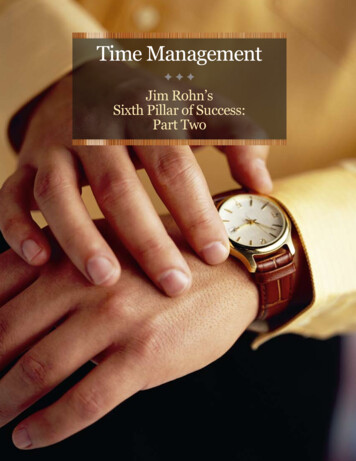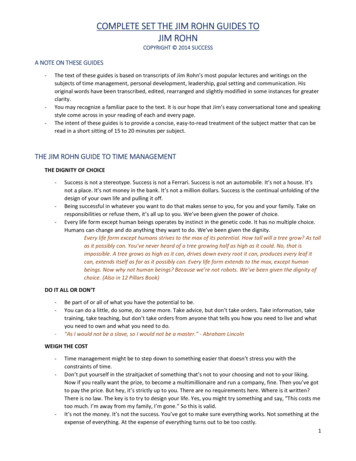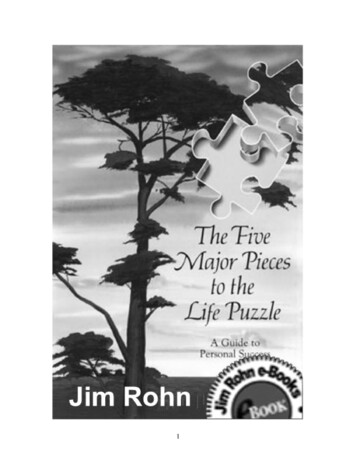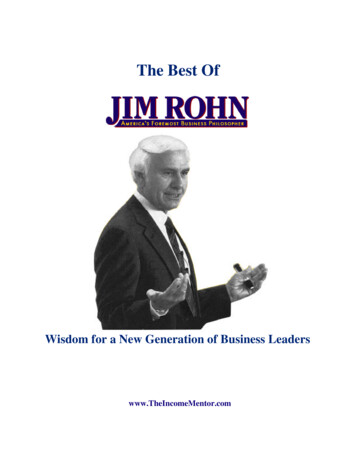
Transcription
Time Management Jim Rohn’sSixth Pillar of Success:Part Two360 One-Year Success Plan 2010 Jim Rohn International
Week 23Welcome to Week 23 of The Jim Rohn One-Year Success Plan. We hope you are having a great weekand are ready for this week’s journey.This week Jim and Chris will talk about taking inventory of, budgeting and scheduling the use of yourtime based on your priority and values.When reviewing this week’s lesson, I’m reminded of my all-time favorite movie, Groundhog Day. I’venoticed over the years that when I mention Groundhog Day, I get a variety of reactions. Some people sawthe movie and thought it was either cute or maybe even silly; many comment that they enjoyed it. But I’vealso found several (about a dozen) kindred souls out there who share my utmost appreciation for it.Although I find the movie funny and clever, I most appreciate the overriding premise. Groundhog Daytells the story of a self-centered and self-serving man who tries to take advantage of a glitch in time(he repeats the same day over and over again) by getting what he thinks will satisfy himself throughmanipulation and pretending to be somebody he isn’t.In the short term, he seems to succeed, gaining the temporal without gaining meaning, but eventually itleaves him in complete despair. It is only through coming to the end of himself and his making a decisionto work on himself and to begin serving others—versus merely taking from others—that he not only findshappiness and fulfillment, but also attracts and achieves his goals (including the girl and love).The turning point in the movie is when the main character (Bill Murray) shares his circumstances anddespair with the lady he has fallen in love with (Andie MacDowell). He tells her he has to relive the sameday over and over again, and that no matter what happens today, tomorrow she will not remember theirconversation or time together and will again think he is a jerk (which he is). She then asks him: “Is itsuch a curse to be able to replay each day over and over again? Think of all the opportunities and thingsyou could do.” The light begins to break through, and from that point on, Bill Murray’s character beginsthe process of personal development and helping other people. He learns to play the piano and sculpt ice,he reads the great literary classics, learns medical techniques to help a dying man, becomes a captivatingreporter who brings a whole city together around his Groundhog Day report—and gets the girl (and shegets him). But he only wins her while in pursuit of his personal development and service to others.We don’t get to relive each day over and over in the literal sense of the word, but every day, in fact, isa new opportunity to take yesterday’s mistakes, shortcomings, as well as victories, and create a newtoday. Initially, Bill’s character had 24 hours a day he thought he had to just get through, viewing themas simply an opportunity for self-gratification. However, the newly enlightened character saw those same24 hours as not only an opportunity to become a person of great skill and knowledge, but to truly make adifference in the everyday lives of others.No matter how implausible the concept of reliving the same day over and over is, the power we possessto become someone great and make a difference each day is not just a fantasy or feel-good idea. Rather,it is one of the most real concepts and principles we have the opportunity to embrace, and it is at theheart of the time management battle. Two important questions we need to ask ourselves are:1. What are we investing our time in?2. What will it make of us and how will it affect others?Make it a powerful and meaningful week!KyleP.S. If you haven’t ever seen Groundhog Day, or ifit’s been a while, rent the movie and let us knowwhat you think. 2010 Jim Rohn International“No matter what you have done tothis moment, you get 24 brand-newhours to spend every single day.”—Brian TracyOne-Year Success Plan361
Time ManagementJim Rohn’s Sixth Pillar of Success:Time Management, Part Two—Creating a Proactive ScheduleHello, Jim Rohn here, and welcome to Part Two of Pillar Six—Time Management. I hope in the pastweek you were able to begin clarifying your core priorities and values, as well as the exact reasonswhy you want to be diligent in managing your time.Here is what we are covering this month under the topic of Time Management:1. Developing a Philosophy of Time Management—Establishing your priorities and values. Asimportant as how to manage our time is first and foremost the why, since the why is the forcethat pulls us toward our dreams and determines the how. First we’ll look at the philosophy of timemanagement and then determine our priorities based on the values we believe in and hold thehighest. Last week we discussed these things in depth.2. Creating a Proactive Schedule—Allocating time based on your unique priorities and values.Once you know why you are managing your time and the priorities and values you strive for, thenit is important to understand where you currently spend your time and how to strategically budgetfor maximum performance. You see, something will always master and something will alwaysserve. Either you run the day or it runs you. This week we will look deeper into this aspect oftime management.3. Breaking Through Barriers—Eliminating time wasters and overcoming procrastination. Manyfolks know what to do, but it is often the things we shouldn’t spend our time on that get us offtrack. It’s important that we not mistake movement for achievement. It’s easy to get tricked bybeing busy, but the key question is: Busy doing what? Next week we will look at how to overcomeprocrastination and eliminate time wasters.4. How to Gain More Time—We’ll talk about time-management pointers and how to reclaim one totwo hours a day through delegating, skill improvement, multitasking and improved focus. Theseare things anyone can do to gain more time in their day. Yes, there are only 24 hours in each day,but we can maximize those hours by working “smarter” rather than longer, and employing otherskills along with our time management. We will look at these ideas in two weeks.This week I want to get down to the basic nuts and bolts of time management. I want to discuss howto proactively schedule your time and allocate it based on your priorities and values.Once you have determined what your priorities and values are—what is most important to you—youwill want to take a hard look at where you actually spend your time.Essentially, this consists of two basic processes. First, we want to take a look at where our time iscurrently being spent—an “inventory,” if you like. It is always wise to start from wherever we areand with whatever we’ve got. From there, we’ll want to begin setting our schedule according to ourpriorities. This could be called “budgeting.”A financial model may be best for us to review in order to help us understand how to go about this.Most of us are familiar with analyzing our finances. The first thing we do is track where our currentspending is and then we write and begin adhering to a budget. This is extremely effective if you aredisciplined enough to follow through, and the same principles work quite well when we look at ourtime management. The process is so simple, yet so very powerful.Time InventoryHave you ever truly looked at where you are spending your time? I mean virtually minute by minute?This is the first order of business because I am sure you will be surprised.362 One-Year Success Plan 2010 Jim Rohn International
A time inventory is done by taking a small journal, calendar or notebook and writing down everythingyou do during the day. I recommend doing this for at least three or four days, but it really is mosteffective when done for a week or two, since there are some things we might only do once a week.Begin tracking what you spend your time on. Write down everything. If you spend 10 minutes on thephone, write it down. If you sleep for eight hours, write it down. If you eat lunch for 45 minutes, write itdown. If you commute 35 minutes eachway, write it down. If you watch televisionfor three hours, write it down.Certainly even one day will begin toreveal some of your patterns. A basic daymay show that you sleep for eight hours,eat for two and half hours, work for eighthours, drive for one and a half hours, talkon the phone for three hours, and watchtelevision for three and a half hours,among other things, of course! Hopefullywhat you will begin to see is that you arespending the right amount of time onsome things that fit with your priorities.You may realize you are neglecting otherthings, and certainly you will see thereare things you are spending an inordinateamount of time on that are opposed toyour priorities.After a few days or so of doing this, sitdown and total up your “spending.” Whatdoes it look like? Where did your time allgo? Are you happy with how you spent it?These things will become clear, becauseif you track it moment by moment, thenumbers will not lie. I believe it is soimportant to make the distinction thattime is more valuable than money. Youcan get more money, but you can’tget more time. Once spent, it’s gone.Assessing our time expenditures is the first step toward getting our “spending” under control, becauseit will show us that our memory of how we spent our time can often be a little foggy. It’s powerful whenwe understand, grasp and apply the principle of wisely budgeting our time.Time BudgetingJust as a person may realize that they have been spending 250 a month eating out when they reallyonly want to spend 100 month, you can begin to set a “time budget” for yourself.Now, I would suggest that budgeting be done once or twice a week, but some of you may need to dothis every day, especially at the beginning of the process.Let’s assume for a moment that you work a typical Monday through Friday workweek. You may want tosit down on Sunday evening and spend a half-hour going through your schedule for the upcoming week.Use this time to group your activities together as much as possible to maximize your time. 2010 Jim Rohn InternationalOne-Year Success Plan363
Week 23For example, you may want to assign one hour each day to answering phone calls or e-mail. Often,our days are interrupted and we work inefficiently, because as we work on something, the phone ringsand we answer it, and then we have to try and pick our task back up (often right in the middle) andgo back to work. This is very inefficient. It is better to have a set time to make and return your calls.Perhaps you need to schedule four half-hour slots a day. This is where knowing your own businesscomes into play, but the idea is to schedule your tasks so that you do them when it is best for you andyour management of time.You may budget five 45-minute lunches during the week. Well, if by Friday you have spent your“budget” on lunches, perhaps you will have to skip one to keep yourself on budget. Just as you wouldstop spending money if you were to reach your financial budget, this same principle will help you withyour time.Now apply this to all of your activities throughout the week. Again, you might need to do this eachmorning, and that is OK—tailor it to whatever works best for you.The key is to set these time budgets according to your priorities. By putting actual time frames intoyour calendar, you place your true priorities at the forefront of your schedule, allowing them to driveyour activities, instead of just doing whatever urgent matter is at hand.Time management takes discipline because at times you will have three hours scheduled for someimportant project and something else will be screaming for your attention. Often it will seem to eitherbe more “urgent” or more fun. Either way, you will need to have the inner fortitude to say no andfollow your time budget. The key here is to not allow the “winds” of the urgent blow you off courseand prevent you from accomplishing your established priorities. Use your schedule—or time budget—as a rudder to guide you through your day and help you reach your goals.The idea here is to be proactive in the use of your time. Too many people take what comes to themrather than proactively pursuing their chosen priorities. Budgeting your time will help you immenselyin achieving the success you desire!In the next section, Chris will give you some thoughts on a powerful time-management equation, aswell as give you some questions for reflection and action points to follow through on.Until next week, let’s do something remarkable!Jim Rohn“Don’t mistake movement for achievement.It’s easy to get faked out by being busy. Thequestion is: Busy doing what?”364 One-Year Success Plan—Jim Rohn 2010 Jim Rohn International
Hi there, Chris Widener here. When I think of accomplishment and success, I think of peoplewho manage their time well. These are people who do what it takes to achieve their dreams. Allaccomplishment is the fruit of what we do, and what we do is determined by how we decide to spendour time.In reflecting on my own life as well as researching the lives of highly successful people, I’ve learnedthat what made most people successful was that they followed a simple time-management equation.Basically, they do the right things in the short term, over and over again, so that when the long termcomes, those short-term actions have brought them success. To explain this a little further, here is ashort article I wrote called, “A Little Equation That Creates Big Results.”A Little Equation That Creates Big Results“The purpose of man is in action, not thought.” —Thomas CarlyleOften people will ask me how I get so much done in my life. They wonder how I am able to accomplishso many things. The answer is found not in what a great person I am, but in an equation I defined a fewyears ago and remind myself of on an almost-daily basis. When I live this equation out, it produces bigresults. What people don’t
ello, Jim Rohn here, and welcome to Part Two of Pillar Six—Time Management. I hope in the past week you were able to begin clarifying your core priorities and values, as well as the exact reasons why you want to be diligent in managing your time. Here is what we are covering this month under the topic of Time Management: 1. developing a Philosophy of time management—Establishing your .











